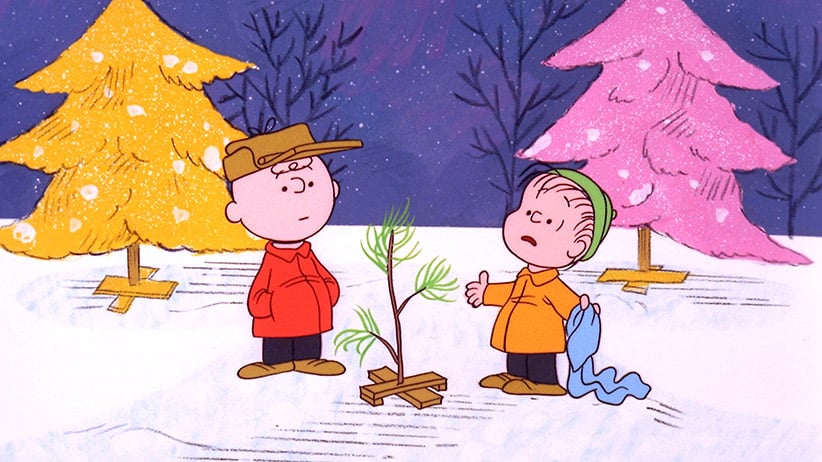Good grief! The commercialism of Christmas isn’t so bad
Colby Cosh on the Yuletide lessons we can learn from Charlie Brown, Lucy, and Ayn Rand
“A Charlie Brown Christmas” – When Charlie Brown complains about the overwhelming materialism he sees amongst everyone during the Christmas season, Lucy suggests he become director of the school Christmas pageant. Charlie Brown accepts, but it proves to be a frustrating struggle; and when an attempt to restore the proper spirit with a forlorn little fir Christmas tree fails, he needs Linus’ help to learn what the real meaning of Christmas is. “A Charlie Brown Christmas” airs on Thursday, December 6 and Sunday, December 16 (8:00-9:00 p.m., ET) on the ABC Television Network. ABC/Getty Images
Share

When I was young, you heard a lot of complaining about the “commercialization” of Christmas. It is hard to recover that mindset now, because we have stopped struggling against the commercialization of just about anything. Nowadays our complaints focus on only the most obscenely obtrusive elements of Yuletide capitalism. Maybe some of us plead with the obscure gods of Marketing and Trends to be spared a barrage of “holiday season” products and decor until after Labour Day. But that is about as far as the objections go. As a rule we are more sincerely, grouchily conservative about stuff like the designated hitter than we are about Christmas.
There are not many advocates left for the view that commerce has no place in a proper Christmas, and that businesses who implicitly make a corporate pitchman of the Christ child are perpetrating blasphemy. Young people may find it hard to believe that this was a major cultural motif of the holiday itself in the late ‘60s and ’70s. People spent a lot of time displaying a longing for an innocent Christmas thought to be located somewhere in the deep human past, a Christmas restored to its original immaterial essence. That, to quote Grandpa Simpson, was the style at the time.
I wonder, for example, what younger generations make of the cartoon A Charlie Brown Christmas. Charles M. Schulz was obviously, almost blatantly, the American Kierkegaard—an austere, offbeat prophet of existentialist unhappiness from America’s weird Nordic/Lutheran corner. Kierkegaard, like other gloomy European philosophers, had a pretty good run of popularity in the ’60s, but you don’t see him on posters very often anymore. Questions about behavioural authenticity and the meaning of ritual fit the mood of a world just beginning to secularize.
In the cartoon, Charlie Brown, clad in classic existentialist discontent, obsesses over whether he is doing Christmas right, eventually experiencing anguish over whether there is any such thing as “right.” The answer to his questions turns out to be a Bible verse quoted by Linus, the theologian of the Peanuts cast, who seems to cut cleanly in one stroke through Charlie’s neurotic contortions. Linus’s Bible quote about peace on Earth and goodwill toward men still chimes in our hearts because of its stately archaic language, but as an answer to Charlie Brown’s concerns it is not rationally satisfying, and in fact it is hard for us to understand Charlie’s problem at all.
It is Lucy who now seems to be the clued-in one—truly a woman ahead of her time. “We all know that Christmas is a big commercial racket,” she tells Charlie Brown. “It’s run by a big Eastern syndicate.” The key is that she says this without rancour, almost admiringly: she would have loved the whole idea of Black Friday.
Ayn Rand, the poet-theorist of capitalism, had a clever Lucy-like line about the “commercialization of Christmas”: she said it was the best thing about Christmas. “The gift-buying . . . stimulates an enormous outpouring of ingenuity in the creation of products devoted to a single purpose: to give men pleasure,” she said in 1976. “And the street decorations put up by department stores . . . provide the city with a spectacular display which only ‘commercial greed’ could afford to give us.”
Rand saw exchange as the ideal model for all human relationships. Sometimes the free-marketeers who have borrowed her style and her ideas are accused of heartlessness for this attitude. Things like holidays and families, they say, should be shielded from the supposedly brutalizing effects of mere trade. What one notices about these arguments is that they smuggle in the notions of exchange and mutual advantage by the back door: everyone benefits selfishly from having havens from selfishness.
What one notices about the people who make these arguments, on the other hand, is that they have an excuse for not being attuned to giving as much as they get in personal relationships or social environments. If you’re exchange- or trade-minded, you will usually be asking yourself whether you’re paying your parents back well for raising you, doing right by your friends, being a good guest when hospitality is extended, observing implied social contracts correctly.
As Rand said, there is a Christmas ideal of “goodwill toward men” that is connected with all these things, and not exclusive to Christianity. The gift-giving part of Christmas, the part where silly mammals rummage in the marketplace trying to please and surprise one another by selecting shiny material objects, has swallowed the part in which we celebrate rescue from hell. It’s a good thing, Charlie Brown. Or a very entertaining sort of racket, at any rate.